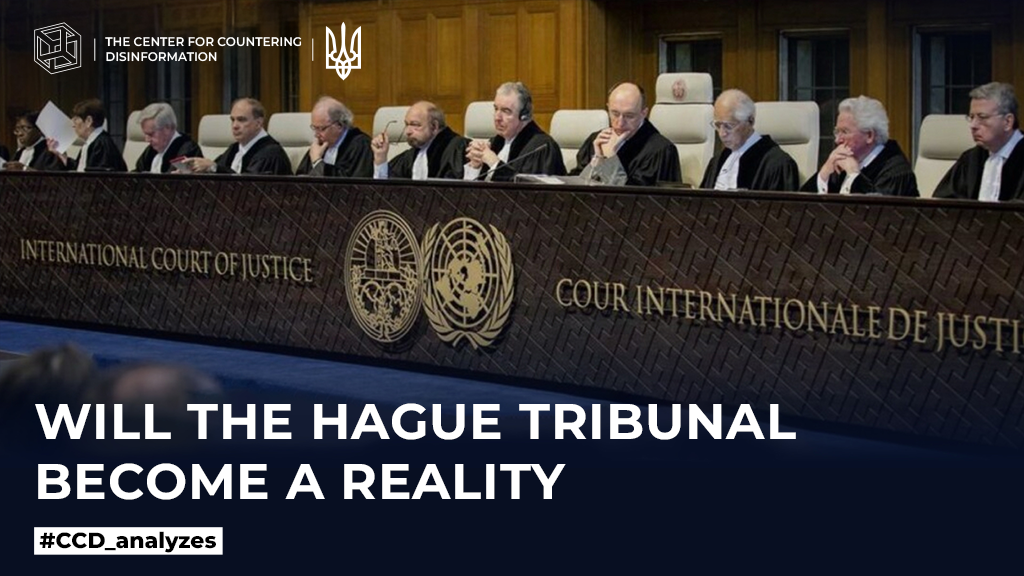The international community continues to debate over the format of a tribunal that would bring russia to justice for the crime of aggression against Ukraine. So far, the opinion of European Commissioner for Justice D. Reynders and the U.S. Department of State on the idea of creating a “hybrid tribunal” that would be part of Ukraine’s judicial system has dominated in the West. The argument is that Ukraine’s key partners are rigidly blocking the classic international tribunal, and the “hybrid” format of the court will not require a UN General Assembly resolution and will “demonstrate Ukraine’s leadership in ensuring accountability” for the crime of aggression. Moreover, certain media outlets have recently been actively promoting the idea that the Ukrainian government, having realized that it would not be able to gain support for the format of the tribunal it proposed, allegedly agreed to the format of a “hybrid” tribunal. They referred to the words of the Deputy Head of the Presidential Office, A. Smirnov, said during an international conference on the special tribunal in Kyiv, that allegedly recognized Ukraine’s readiness to make concessions regarding the tribunal. In fact, the format of an internationalized tribunal based on the legal system of another country was only one of the options that emerged during the discussions. However, Smirnov explained that Ukraine continues to advocate for a special tribunal based on the decision of the UN General Assembly and the agreement between Ukraine and the UN, and does not accept the option of a tribunal based exclusively on the Ukrainian judicial system. According to the representative of the Ukrainian authorities, this scenario is the fastest and definitely the most effective tool for implementing international law.
Why is Ukraine not satisfied with the “hybrid” format of the tribunal?
First, the Ukrainian Constitution explicitly prohibits the creation of special courts to investigate a single crime and does not allow foreign judges to make decisions in the name of Ukraine – this requires amendments to the Basic law, which is impossible during martial law.
Secondly, this approach narrows the legal assessment of the crime of aggression of the russian federation to the level of an armed conflict between two countries. However, the crime of aggression committed by russia’s top political and military leadership concerns not only Ukraine – it is a crime against the entire civilized world, and a tribunal decision in the name of Ukraine will level its significance for other countries.
Thirdly, the “hybrid tribunal” is unacceptable because it does not guarantee the removal of immunity from the leaders of the russian federation (president putin, prime minister mishustin and foreign minister lavrov). They are trying to convince Ukraine that the trial of putin personally will begin only after his resignation, which is unacceptable for Ukraine in the context of the genocide against the Ukrainian people being carried out on the command of the current russian president.
Naturally, various options arise during the discussions, including the creation of an internationalized tribunal to be established “in another country whose legal system is credible, with a subsequent vote in the UN General Assembly in support of the established internationalized tribunal.”
What are the obstacles to the implementation of the Ukrainian format of the tribunal against russia?
Although the system of international law formally recognizes a war of aggression as an international crime, there is no punishment for armed aggression against another state. To be more precise, only those states that have separately ratified a treaty on their responsibility for such actions (the so-called Kampala Addendums to the Rome Statute of the ICC, on the basis of which the International Criminal Court was established and operates) can be punished for aggression. Ukraine is also not a party to the Rome Statute, although it has granted the International Criminal Court the right to investigate crimes on its territory. The Ukrainian government believes that Ukraine should ratify the Rome Statute only after winning the war against russia. Russia signed the statute, but later withdrew its signature, hoping that it could commit aggression with impunity. Therefore, the ICC can prosecute Ukrainian citizens without ratifying the Rome Statute, but this issue remains a subject of debate.
Kyiv does not fundamentally reject the possibility of establishing a so-called internationalized tribunal, which the United States, in particular, insists on, provided that it is not based on the Ukrainian judicial system. The format proposed by Ukraine to create a separate institution to investigate a single crime – russian aggression against Ukraine – based on the adoption of a UN General Assembly resolution and an agreement between Ukraine and the UN can become a real watershed in international law, as it allows to bypass russia’s veto in the UN Security Council and create a precedent when the world unites to punish a malicious violator of international law and receives a legal basis for this. We hope that the final decision on the format of the special tribunal will be made by the International Court of Justice during the hearings on Ukraine’s claim, which will take place on September 18-27, 2023.










